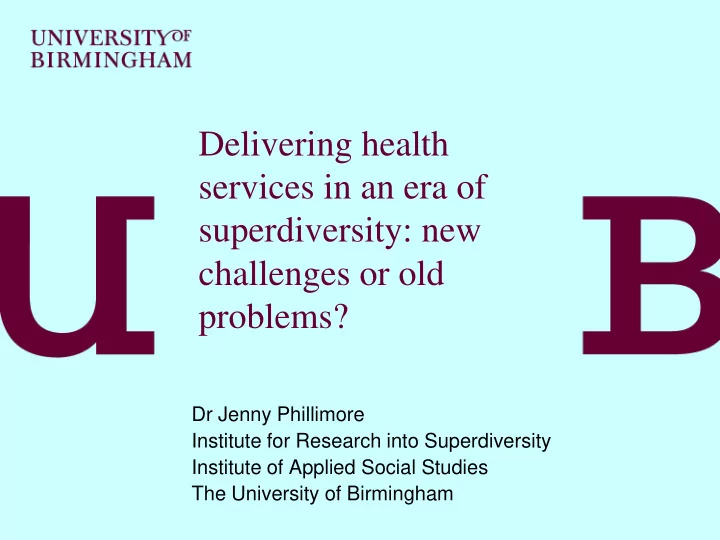

Delivering health services in an era of superdiversity: new challenges or old problems? Dr Jenny Phillimore Institute for Research into Superdiversity Institute of Applied Social Studies The University of Birmingham
Introduction Superdiversity and welfare provision Superdiversity in the West Midlands Old problems and new challenges in health provision Newness and novelty A tentative way forward
Superdiversity “Diversification of diversity” (Vertovec 2007 Speed – 9% to 13% born overseas Scale – census – 3.5m rise in population 56% are migrants Spread – now urban and rural i.e. Boston highest increase in AoW (11.4%) Complexity – gender, status, age, reason for migration, class, faith....... Fragmentation – from many migrants from a few countries to a few from many Super-mobility
Superdiversity and access to welfare Emergence of superdiversity and global neighbourhoods Social scientific and policy challenges (Vertovec 2006) Viability of MC approaches to welfare delivery questioned (Ahmed & Craig 2003) – Politically (backlash, alleged loss of social solidarity) – Financially (austerity cuts) – Practically (weakness of ethnicity approach) Need for new models (Vertovec 2006) Focus on health provision in W. Midlands
The West Midlands
SD, migration, and health in West Midlands Central region, 2 nd biggest urban area, high deprivation and rural remoteness Birmingham to become majority/minority city Migrants from 187 countries – old and new migrants, clustered and fragmented (table) High levels of deprivation, exclusion, poor health outcomes and highest infant mortality rates in Europe Is there a crisis in welfare delivery? Are there new challenges for providers?
Numbers Categories of migrant Pakistan 5585 Family/marriage, economic migrants, students, asylum seekers India 4559 Family/marriage, economic migrants, students, asylum seekers Poland 4172 Economic migrants (A8), students China 2514 Economic migrants, students, asylum seekers, family reunion/marriage Bangladesh 1551 Family/marriage, economic migrants, students, asylum seekers Romania 1351 Economic migrant (A2), students Afghanistan 1180 Asylum seekers, family reunion Nigeria 1118 Economic migrants, students, asylum seekers, family reunion/marriage Somalia 1047 Asylum seekers, family reunion France 860 Economic migrant, asylum seekers with French citizenship Germany 782 Economic migrant, asylum seekers with German citizenship Slovakia 685 Economic migrant (A2), students Iran 684 Asylum seekers, students, family reunion Malaysia 660 Family/marriage, economic migrants, students, asylum seekers Iraq 507 Asylum seekers, family reunion Saudi Arabia 485 Economic migrants, students, family/marriage, asylum seekers USA 481 Family/marriage, economic migrants, students Netherlands 431 Economic migrant, asylum seekers with Dutch citizenship Philippines 429 Family/marriage, economic migrants, students, asylum seekers Jamaica 413 Economic migrants, students, family reunion/marriage Others 11824 Various Total 41318
Methods No reliable/complete socio demographic data Need to generate findings with policy relevance to improve services Four research projects focusing on different aspects of health (MH, maternity, primary care) Move from ethnicity sampling to SD sampling Selection on the basis of difference Questionnaires and interviews by community researchers with new migrants Interviews with health professionals
Old problems New challenges Migrants Language Initially Difficulty identifying translators/ interpreters for “new” languages” Transiency Populations tended to be more Break in continuity of care fixed Pressure on Initially Pressure of numbers means limited General services Practitioner spaces Over-use of A&E Rights and Free access to NHS – assumed in End of free access - health problems neglected entitlements the UK legally until acute Others incorrectly denied free access Inability to Initially “Misuse” of services understand institutional culture Cultural needs Initially but later specialist For “old” migrants but not new not met services developed Destitution No In hiding and no income so health seeking is restricted Isolation No Fragmentation means lack of critical mass
Old problems New challenges Providers Languages Initially but eventually Problems accessing appropriate interpretation and minority staff translation/ interpretation plus reduced and development of expertise budgets Transiency No Inability build relationships with patients, new patients requiring intensive intervention Lack of data Yes Yes Lack of knowledge Initially but over time knowledge Constant newness and novelty mitigates acquired against development of knowledge Outsourcing of No Health providers have role in immigration control restrictionalism and expected to deny those who can’t pay Destitution No Charges for those with NRPF Multiple problems To some extent New levels of complexity as immigration status interacts with ethnicity, language, culture etc
Discussion: newness and novelty Novelty – Novel language, culture and systems for migrants – Novel languages, cultures, immigration rules and roles, and entitlements for professionals – Novel encounters with diversity in rural (& urban) areas – Novel combinations of problems with no clear solution Newness – Lack of established community with collective knowledge to support or guide migrants – Patients always new when high levels of transiency: require extra time and admin costs – No opportunity to develop knowledge or expertise
Discussion Scale of arrivals exceeds all previous experience Superdiversity treated as a problem to be controlled at borders rather than a condition No funds, time or training to adjust NHS restructuring and austerity cuts leading to loss of expertise around old problems Consequences: Migrants: over- use, misuse or don’t use system Professionals: overwhelmed, confused and powerless and sometimes resentful
What to do? Need to acknowledge new reality of SD Not practical/possible for professionals to acquire comprehensive cultural knowledge or identify interpreters for all Move from multicultural mindset to interculturalism – make no assumptions Train all new professionals in intercultural communication Educate children about institutional cultures New health intermediary role Invest to save????
Conclusion Social policy challenges associated with SD Repeating all of the old problems Experiencing many new problems associated with “super” - diversity, scale, speed and spread, complexity and fragmentation Much work is needed to : – Understand common and divergent challenges – Identify innovative, sustainable and free solutions
Recommend
More recommend